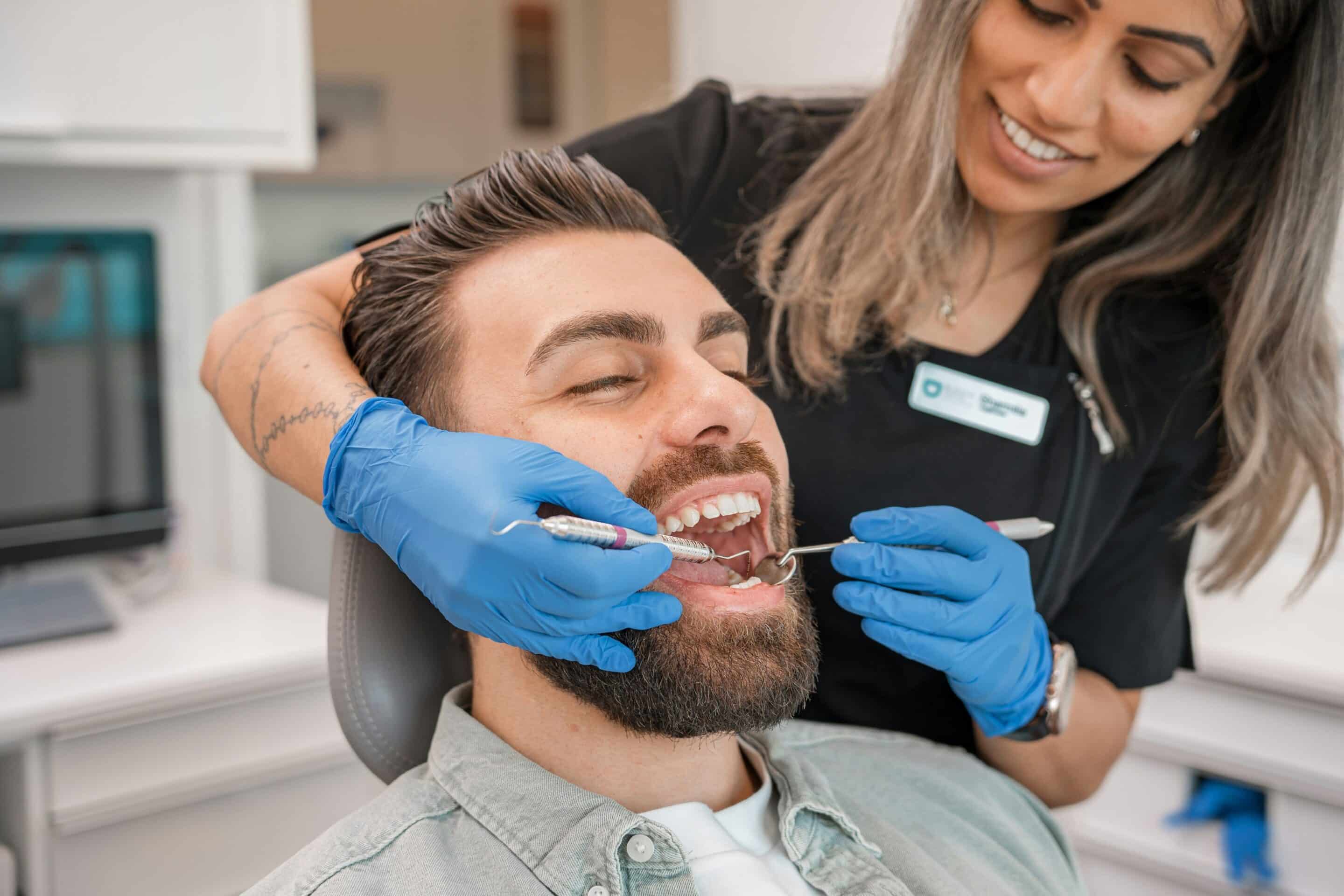
It’s common knowledge that brushing, flossing, and regular dental check-ups are essential for maintaining healthy teeth and gums. And today, more and more people are discovering how important oral health is for general health. But there’s one more aspect that you may not expect: research suggests there’s a connection between oral health and cognitive decline. Yes, taking care of your smile could help you take care of your brain.
In short, scientists are exploring how taking care of your mouth can affect memory, problem-solving skills, and independence as we age. While many of us focus on mind games and puzzles, regular exercise, and a healthy, balanced diet to support brain health, good oral care may be an overlooked piece of this very important puzzle.
Fortunately, taking care of your smile is one of the easiest habits you can practice—and it only takes a few minutes every morning and evening. It can keep your smile vibrant, improve your overall health, and may help you keep your mind sharp, too.
Why Cognitive Health Matters
Cognitive health is really about “how well the brain works” on a day-to-day basis. That includes how we remember names, how well we focus on a task, our ability to think critically and solve problems, and how we work through scenarios to make better decisions. In other words, cognitive health enables us to stay independent, connected, and engaged in the world around us.
As we get older, it’s only natural for our bodies and our brains to change. But that doesn’t mean we can’t remain healthy and strong. Preventing cognitive decline can make a significant difference in our quality of life. That’s why brain-boosting activities—from reading to playing Sudoku and other brain games, to learning new skills and staying physically active—become increasingly popular as the birthday candle count increases.
What many people overlook, however, is the potential connection between oral health and cognitive decline. Indeed, there’s good evidence that caring for your teeth and gums could give your brain an extra boost.
What the Research Says About Oral Health and Cognitive Decline
While the science is clearly still developing, researchers asking if oral health could be connected to brain health are finding the answer could be yes.
For instance, studies have found that folks with gum disease or significant tooth loss have a higher risk of cognitive decline. Other research shows that those who have trouble chewing or poor oral function due to, for example, tooth loss, may experience changes in memory and thinking skills. Like much research, not all studies come to the same conclusions, so there is a need for more research to better understand the connection between oral health and cognitive decline.
What’s more clear, however, is how closely oral health is connected to overall health, including reducing the risk of diabetes and heart disease. So even if the connection between oral health and cognitive decline is less than expected, it’s still important to keep your teeth and gums healthy.
How Oral Health Could Affect the Brain
By now, you may be asking how: how could what’s happening in your mouth impact your brain? While we don’t yet have all the answers, there are a few possible connections.
- Inflammation: Gum disease causes inflammation in the mouth. That inflammation doesn’t just stay put, though. It can spread through the bloodstream, potentially leading to a stress reaction in other parts of the body. That includes the heart as well as the brain.
- Chewing: Most of us don’t realize the importance of chewing our food. Having healthy teeth means we’re more likely to be able to enjoy nutrient-rich fruits, vegetables, proteins, and healthy fats that are key to a healthy brain. Chewing is not only important for digestion, though. Research has found it may help relieve stress and regulate cognitive function. It may even help improve attention and increase alertness.
- Confidence: When our teeth and gums are feeling (and looking) good, we’re more likely to smile and socialize. Staying socially connected is vital to our overall health and happiness.
- Overall health: Our mouths are one of the most visible windows into our overall health. And problems within the mouth sometimes reflect issues in other parts of the body.
Daily Dental Habits that Support Brain (and Whole-Body) Health
Simple habits can pay off big for your smile, your overall health, and possibly your brain health. Best of all, you likely not only already know about but already practice many, if not all, of them, including:
- Brushing twice a day for two minutes each with a soft-bristle toothbrush and quality toothpaste to keep plaque under control.
- Floss daily to remove plaque and bacteria from areas your toothbrush simply can’t reach, especially between teeth and under the gumline.
- Don’t ignore bleeding when brushing or flossing. This is often an early sign of gum disease, and catching it early makes treatment simpler, more effective, and usually more affordable.
- Schedule regular dental check-ups and cleanings. Your dental team can help spot small problems before they grow into big ones, such as early signs of gum disease.
- Consume a healthy diet that’s rich in crunchy fruits, leafy greens, nuts, and quality proteins to keep your teeth strong and deliver brain-friendly nutrients. In addition, limiting sugar and starchy foods can help both your oral and overall health.
- Stay hydrated. Water not only washes away food particles. It helps maintain healthy saliva, which naturally protects teeth and gums.
Adopting healthy habits doesn’t just protect your smile; it’s an investment in long-term health and independence.
Oral Health and Cognitive Decline Takeaways
Your smile doesn’t just light up a room, communicate a relaxed and happy state, or serve as the first stage of digestion. It also plays a role in keeping your body—including your brain—healthy. There’s still much to learn about exactly how oral health and cognitive decline are connected, but one thing is clear: caring for your teeth and gums is an important part of caring for your whole self.
Indeed, a healthy mouth could support memory, focus, and independence as we age. So, give your future self this little extra edge by continuing to brush, floss, and get regular check-ups. It’s one of the easiest and most powerful ways to invest in your overall health.
